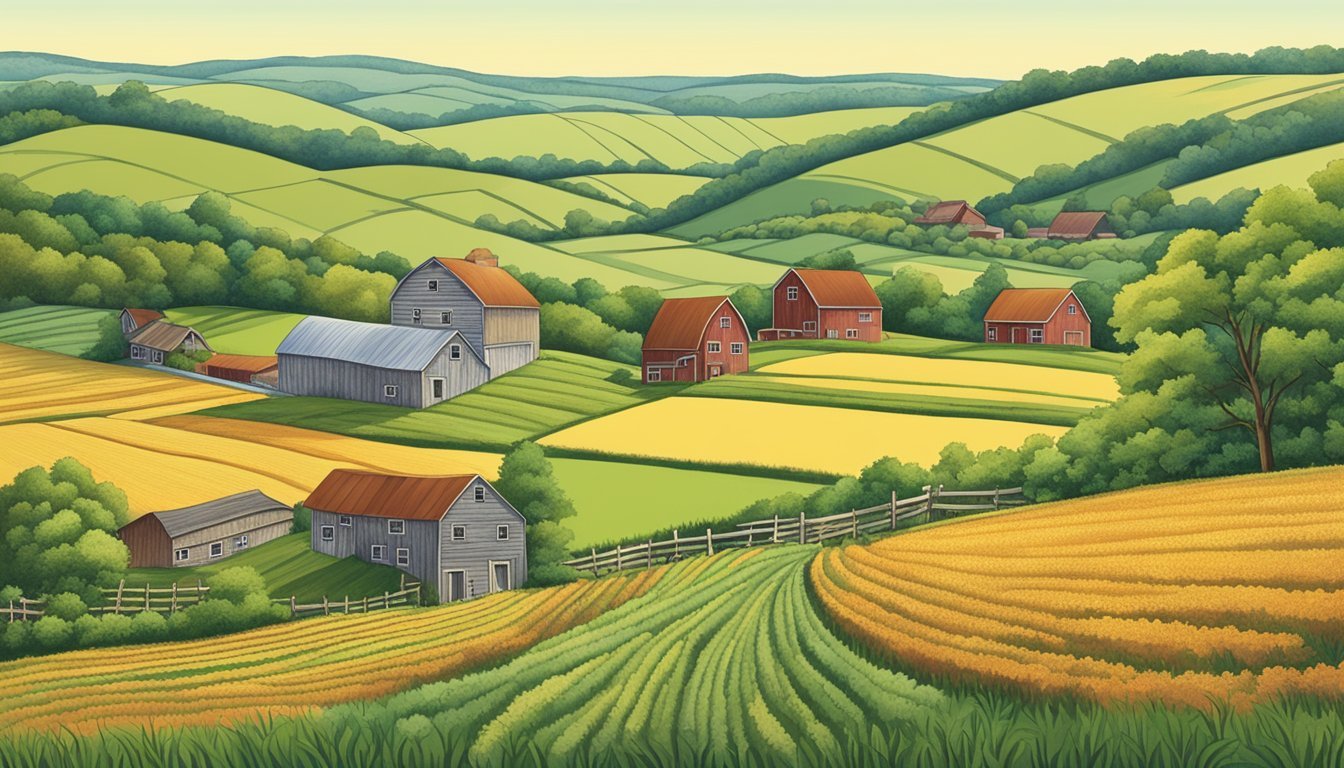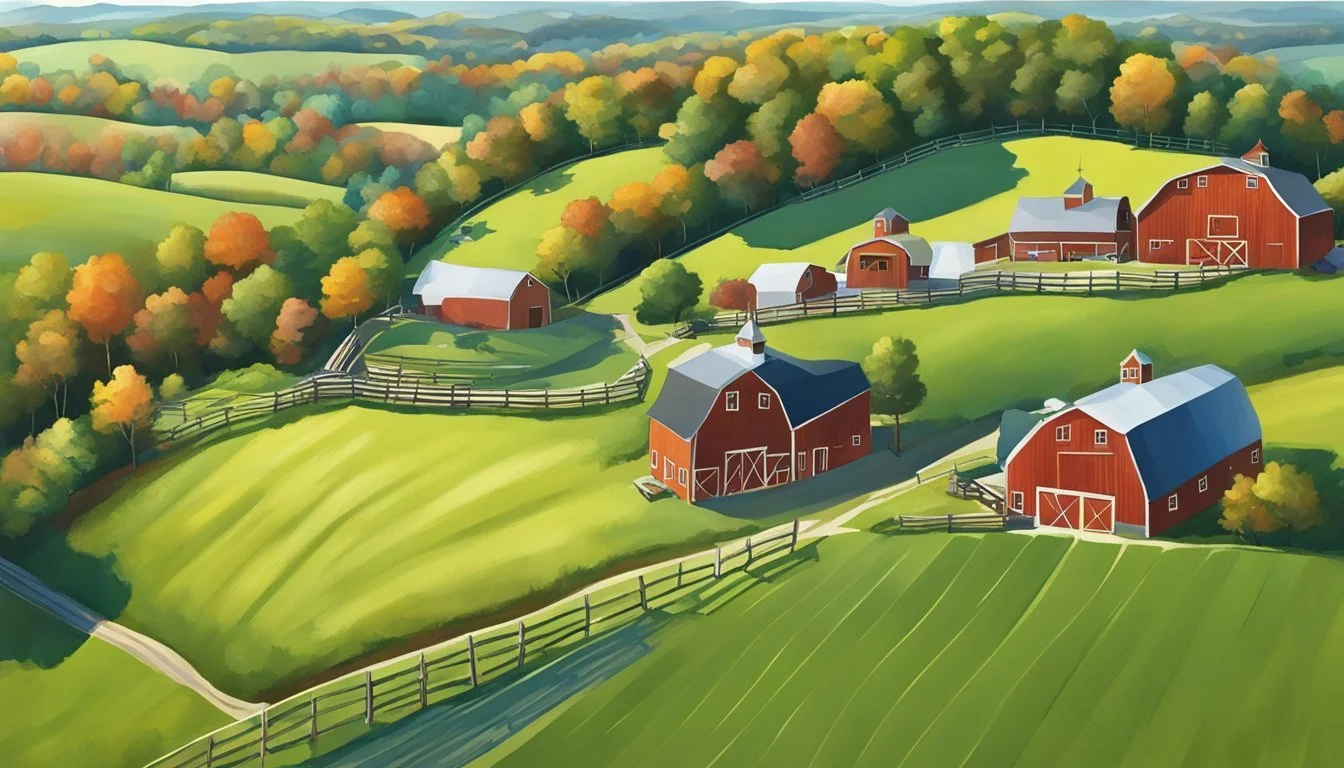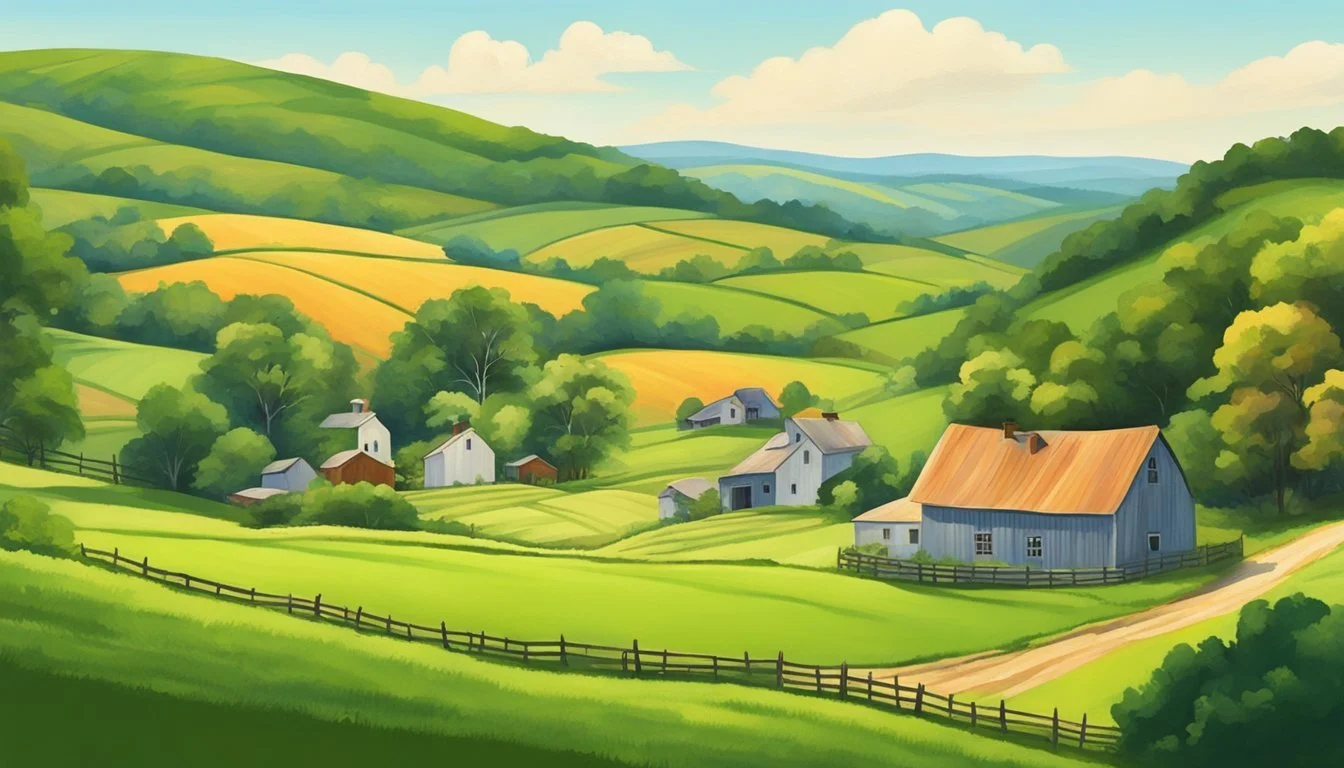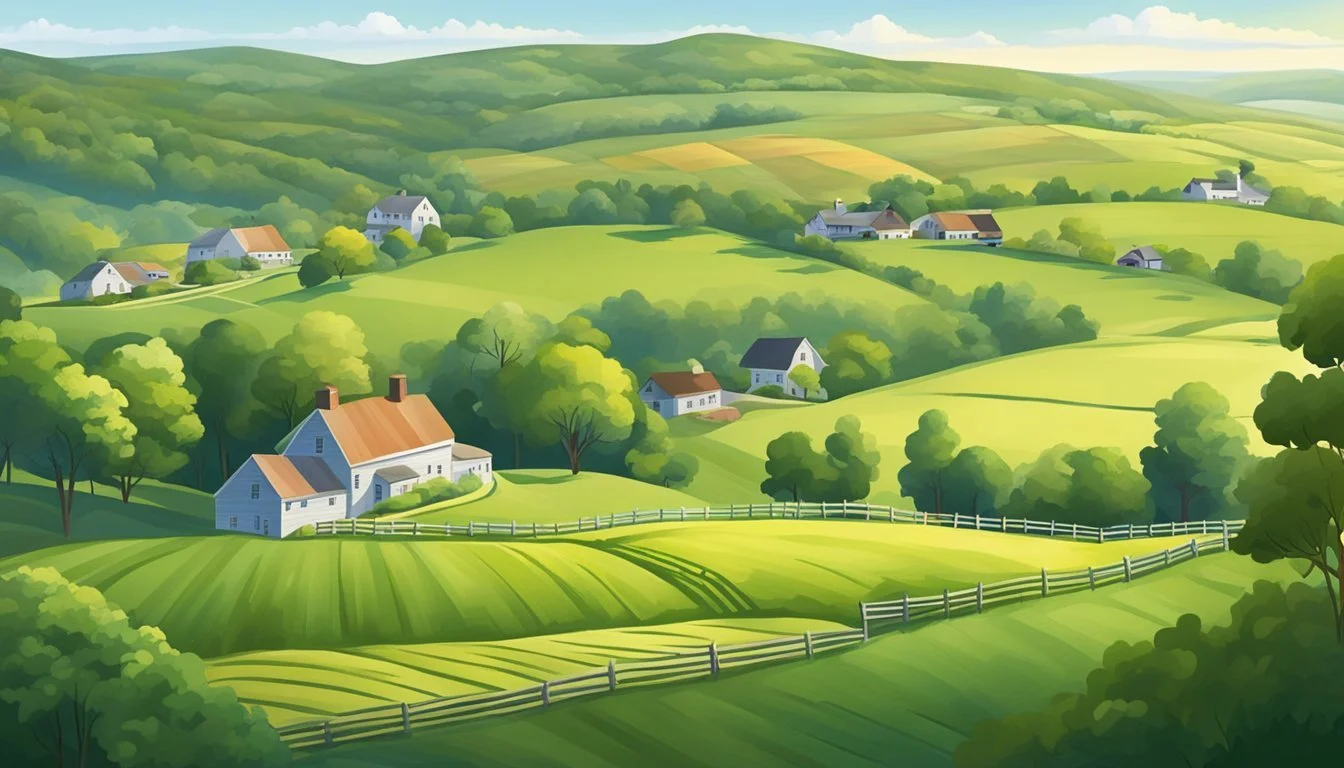Small Farms for Sale in Massachusetts
Your Guide to Finding the Perfect Homestead
This Article is Part of State-by-State Guide to Buying Your First Small Farm
Massachusetts is a state deeply rooted in agricultural history, with a landscape that continues to support a diverse array of small farms. These small-scale operations epitomize the region's dedication to sustainability and local food systems. For those interested in becoming part of this vibrant farming community, the Massachusetts real estate market offers various opportunities to purchase small farms. These properties often come with the quintessential New England charm and include acres of arable land suitable for a variety of agricultural pursuits, from traditional row crops to specialty organic farming.
The market for small farms in Massachusetts is as varied as the state’s geography, ranging from the rolling hills of the Berkshires to the flat, fertile lands of the Pioneer Valley. Prospective buyers can find farms with different features such as restored farmhouses, barns, greenhouses, and even full operational facilities for animal husbandry. The size of these farms typically allows for manageable operations for individual farmers or family-run businesses, emphasizing a high-quality, hands-on approach to agriculture.
Recent real estate listings in the region reflect the active demand for rural properties. They present a range of options with detailed information about land size, location, and existing farming infrastructure. Potential buyers are provided with resources to compare prices and features, ensuring they find a property that meets their specific farming goals and lifestyle preferences. Whether one is an experienced farmer looking to expand operations or a newcomer eager to embark on a rural lifestyle, Massachusetts’ small farms for sale present a unique opportunity to participate in and contribute to the state’s agricultural legacy.
Overview of Small Farms in Massachusetts
Massachusetts boasts a diverse agricultural landscape, with small farms playing a crucial role in the local economy and cultural heritage. These farms range in type from traditional crop farms to specialty hobby farms, contributing to the state’s unique agricultural profile.
Significance of Agriculture in Massachusetts
Agriculture is a vital part of the Massachusetts economy, generating thousands of jobs and contributing significantly to the local food system. The state's agricultural industry thrives not only on the production of a wide array of crops but also on the stewardship and conservation of its picturesque landscapes, which small farms help to maintain. Despite its relatively small size, Massachusetts offers a variety of farms for sale, reflecting the state's commitment to supporting both the agricultural sector and rural community lifeways.
Types of Small Farms
Massachusetts features an array of small farm types, including but not limited to:
Traditional Farms: Typically engaged in growing local produce, grains, or raising livestock.
Organic Farms: Those that implement organic farming practices and are often certified, focusing on sustainable, chemical-free agriculture.
Specialty Farms: These may focus on niche markets such as vineyards, orchards, or hobby farms specializing in rare breeds or products.
Farms for sale in Massachusetts vary greatly, catering to diverse farming interests and operational scales. Potential buyers have the opportunity to invest in properties that already have established agricultural infrastructure or to build their own farming enterprise from the ground up.
Real Estate Market Analysis
The Massachusetts small farm real estate market shows distinct trends in listing ages and median purchase prices, providing potential buyers with a snapshot of current market conditions.
Current Market Trends
Small farm listings in Massachusetts range from modest acreage in Bristol County to larger spreads in Hampden County. The market reflects a growing interest in sustainable living and local food production, leading to heightened demand for rural properties with farming potential.
Average Listing Age
The average listing age varies across the state. For instance, properties in Hampden County are observed to have listings available for several months, while in Bristol County, listings may have a shorter average duration on the market. This contrast indicates a diversity in demand influenced by location, property features, and local market dynamics.
Median Purchase Price
The median purchase price for small farms in Massachusetts can be subject to a wide range due to factors such as land acreage, existing farm infrastructure, and location desirability. As an indication, properties range from approximately $600,000 for a 6.13-acre farm in Bristol County to upwards of $1,999,999 for an 18.4-acre property in Hampden County. These figures highlight the significant variation in farm real estate pricing, which prospective buyers should consider in their search.
Understanding Property Listings
In this section, readers will learn how to effectively interpret the information given in property listings and conduct a detailed price per acre analysis to evaluate the value of farm properties for sale in Massachusetts.
Interpreting Listing Information
When evaluating land for sale, it's crucial to understand the details provided in the listing. A listing typically includes the property size in acres, the number of bedrooms and bathrooms if there is a residence, along with other key features like the type of land (e.g., farmland, ranch, hunting property). The information might look like this:
Property Size: 62 acres
Bedrooms: 4
Bathrooms: 3
Property Type: Farm
It is essential to verify this information by cross-referencing with other listings or public records when possible, as inaccuracies can influence the perceived value and suitability of the property for the buyer's intended use.
Price Per Acre Analysis
The listing price is often provided, but to understand the value, one should calculate the price per acre. To determine the price per acre, divide the listing price by the total acreage. For example:
Listing Price: $900,000
Total Acreage: 6.5 acres
Price Per Acre = $900,000 / 6.5 = $138,461.54
Providing a table can clarify variations in price per acre across different listings:
Listing Price Acreage Price Per Acre $649,000 62 acres $10,468.75 $900,000 6.5 acres $138,461.54 $1,999,999 18.4 acres $108,695.60
A lower price per acre might indicate a better value, but it’s not the sole indicator of a good deal. Factors such as location, land quality, and existing infrastructure also affect the overall value and must be taken into account.
Financial Considerations
When considering the acquisition of a small farm in Massachusetts, a potential buyer must evaluate the financial implications carefully. Key aspects include understanding the purchase price and the processes for assessing the property's value.
Calculating Purchase Price
The purchase price of small farms in Massachusetts varies widely depending on location, acreage, and amenities. For instance, recent listings show that an 18.4-acre property in Hampden County can be listed at approximately $1,999,999, while a smaller 6.13-acre farm in Bristol County is priced at $600,000. One must consider the property's features such as existing farm buildings, the condition of the land, and any included farm equipment, as these can significantly affect the price.
Average Purchase Price: While listings may fluctuate, buyers should research to ensure they understand the prevailing market rates for small farms. For example, a look at recent sale prices across various counties:
County Acreage Listed Price Hampden 18.4 $1,999,999 Bristol 6.13 $600,000 Middlesex 8.84 $975,000 Bristol (again) 6.5 $900,000
This table represents only a sample and prices can differ substantially based on the individual characteristics of each farm.
Assessing Property Value
Property valuation is crucial for both buyers and sellers. An accurate assessment takes into account the farm's land value, its current use, potential for productivity, and any existing infrastructure such as irrigation systems, dwellings, and storage facilities. Buyers often utilize professional appraisal services to determine a property's fair market value, considering the sale prices of similar properties in the area as a benchmark. Assessing property value accurately not only informs the buyer of the investment's worth but also assists in securing financing, negotiating prices, and understanding future property tax implications.
Property Size and Acreage
When considering small farms for sale in Massachusetts, property size and acreage are critical factors. They dictate not only the potential uses of the farm but also impact the maintenance and price.
Determining Ideal Acreage
The ideal acreage for a small farm in Massachusetts depends on the buyer's intended use. For hobby farming, a few acres might suffice, typically between 6 to 10 acres. For more commercial farming ventures or those requiring additional structures, buyers often seek properties with 10 to 50 acres.
Hobby farming: 6-10 acres
Commercial farming: 10-50 acres
Comparing Property Sizes
Property sizes in Massachusetts can vary widely. Based on recent listings:
In Hampden County, an 18.4-acre farm is available.
Bristol County showcases a 6.13-acre and a slightly larger 6.5-acre option.
Middlesex County features an 8.84-acre property.
A substantial 62-acre lot is noted in Plainfield, MA.
Buyers should compare these sizes to ensure they are aligning with their farming plans and goals. It’s crucial to assess the acreage in relation to the work required for upkeep and the flexibility it offers for future expansion or diversification of farming activities.
Legal and Zoning Considerations
When considering the purchase of a small farm in Massachusetts, one must carefully navigate the state's zoning laws and understand the legal requirements that will apply to their agricultural pursuits.
Understanding Zoning Laws
Zoning laws in Massachusetts can significantly impact agricultural use of land. They regulate land use to ensure that the land is used for its intended purpose, thereby avoiding conflicts between different land uses. Prospective buyers should consult the Massachusetts Zoning Act, particularly Chapter 40A, to understand how these regulations may affect their intended use of the property.
Agricultural Zoning: A farm in Massachusetts typically falls under agricultural zoning, which dictates specific land-use regulations such as:
Minimum acreage requirements
Types of permissible agricultural activities
Building and structure regulations
It's important for buyers to check with local zoning authorities to confirm that their intended use aligns with existing zoning by-laws.
Navigating Legal Requirements
Navigating legal requirements involves understanding the applicable laws and how they affect the operation of a small farm.
Agricultural Preservation Restriction (APR) Program: Some farms may be enrolled in the APR program, which aims to preserve and protect agricultural land. Participating in this program requires compliance with the following:
The farm must be at least five acres in size.
Has been actively devoted to agriculture for the two immediately preceding tax years.
Must produce a minimum of $500 in gross sales per year for the initial five acres.
Additionally, when acquiring property, one should be aware of case law, like Bjorklund v. Zoning Board of Appeals of Norwell, which highlights instances where zoning boards have intervened in the modification of existing structures.
Other considerations include:
Labor Laws relevant to farming operations
Disaster Assistance and Crop Insurance provisions
Compliance with these legal requirements is essential for a farm's operation and should be a key factor in the decision-making process for the purchase and development of a small farm in Massachusetts.
Conclusion
The market for small farms in Massachusetts demonstrates diverse opportunities for potential buyers. They range from practical homesteads in Hampden County to expansive acres in Barnstable County. Prospects looking at a smaller scale might consider properties such as the 18.4 acres in Wilbraham, or the 6.13 acres available in Bristol County.
Investors or families seeking more space have options like the 8-acre property in Mashpee or a 25-acre farm in Sandwich. The range of prices indicates Massachusetts caters to various budgets, with farm properties available from the mid-hundreds of thousands, stretching into multi-million dollar estates.
Property sizes vary from around 6 acres up to 254 acres
Listings include features such as modern homes, ample land, and existing farm facilities
Residential features often include multi-bedroom homes, often with two or more bathrooms, suitable for families and farmhands
Agricultural aspects may include operational barns, outbuildings, and fenced pastures
Buyers should assess their needs concerning location, size, and infrastructure. With properties spread across the state, one can find a farm that aligns with geographic preferences and lifestyle goals. The Massachusetts small-farm market caters to both seasoned farmers and those new to rural living, offering a slice of pastoral life within a vibrant state known for its history and beauty.






